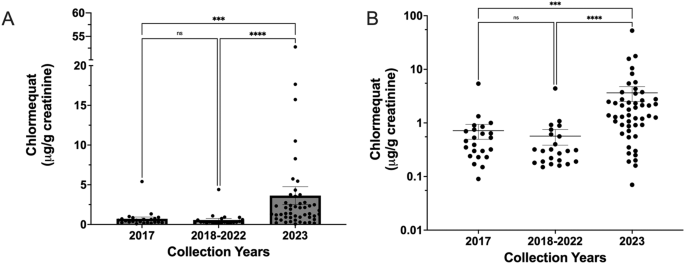- Joined
- Feb 4, 2013
- Messages
- 8,797
- Reaction score
- 9,942

EWG finds little-known toxic chemical in four out of five people tested
A new EWG peer-reviewed study has found chlormequat, a little-known pesticide, in four out of five, or 80 percent, people tested. The groundbreaking analysis of chlormequat in the bodies of people in the U.S. rings alarm bells, because the chemical is linked to reproductive and developmental...

A pilot study of chlormequat in food and urine from adults in the United States from 2017 to 2023 - Journal of Exposure Science & Environmental Epidemiology
Chlormequat chloride is a plant growth regulator whose use on grain crops is on the rise in North America. Toxicological studies suggest that exposure to chlormequat can reduce fertility and harm the developing fetus at doses lower than those used by regulatory agencies to set allowable daily...
EWG’s research, published February 15 in the Journal of Exposure Science and Environmental Epidemiology, tested for the presence of chlormequat in urine collected from 96 people between 2017 and 2023. The chemical was found in the urine of 77 of them.
Study shows that use of the chemical has increased since Trump's EPA deregulated it and with additional deregulations by Biden's EPA.
It was detected in 92% of oat-based foods, including Cheerios and other popular Quaker products.
The EPA actually bans it's use in food products in America and only allow it for ornamental plants. But it has no such restriction on oats imports.
Chlormequat was not allowed on oats sold in the U.S. before 2018, when the Trump EPA gave first-time approval for some amount of the chemical on imported oats. The same administration in 2020 increased the allowable level. These regulatory changes might help explain why we’re seeing more frequent, higher detections of the chemical in Americans tested.
In April 2023, in response to a 2019 application submitted by chlormequat manufacturer Taminco, the Biden EPA proposed allowing the first-ever use of chlormequat on barley, oat, triticale and wheat grown in the U.S. EWG opposes the plan.
If you were wise enough to eat organic foods you may be safer, as it seems to be much less prevalent.
Be careful out there bros. Of course this isn't definitive proof that the chemical is harmful for everyone or the amount in food is overly harmful. But good to keep in mind when making food decisions.


